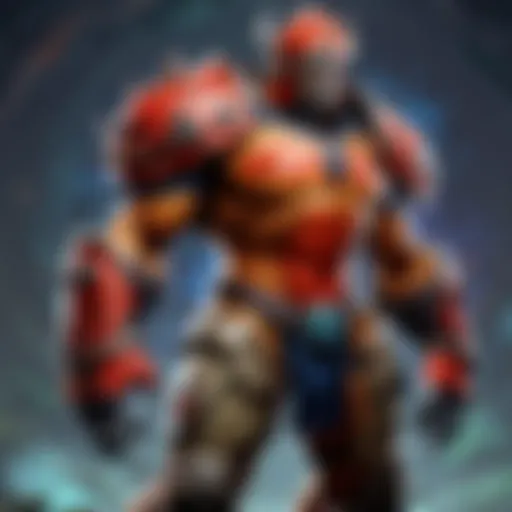Discovering Your True Hogwarts House: A Guide
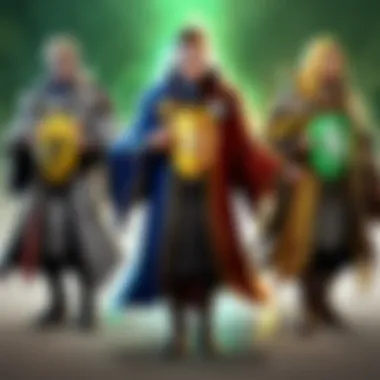

Intro
Discovering your Hogwarts house can be a fascinating journey that not only reveals your traits but also connects you with a vibrant community within the Harry Potter fandom. The significance of each house extends beyond the books, influencing personality, values, and social interactions among fans. In this section, we will explore how to embark on this magical quest, considering both official and fan-made materials.
Understanding the Hogwarts Houses
Hogwarts School of Witchcraft and Wizardry is divided into four houses: Gryffindor, Slytherin, Ravenclaw, and Hufflepuff. Each house possesses distinct characteristics, values, and background stories that create a rich tapestry within the canon.
- Gryffindor: This house is known for bravery, courage, and chivalry. Famous members include Harry Potter, Hermione Granger, and Ron Weasley.
- Slytherin: Slytherins are known for ambition, cunning, and resourcefulness. Notable figures associated with this house include Severus Snape and Tom Riddle.
- Ravenclaw: Emphasizing intelligence and creativity, Ravenclaw is home to characters like Luna Lovegood and Cho Chang.
- Hufflepuff: Valuing loyalty, patience, and hard work, this house includes figures such as Cedric Diggory and Nymphadora Tonks.
Understanding these fundamental traits helps participants align themselves with their true Gryffindor, Slytherin, Ravenclaw, or Hufflepuff nature. It acts as a lens through which to navigate personal affinities and shared experiences.
Understanding Hogwarts Houses
Understanding the Hogwarts houses is fundamental for any fan navigating the Harry Potter universe. Each house represents distinct values and has a unique identity, thus shaping the experience of wizards and witches within that world. By grasping these elements, you can better appreciate the reasoning behind your house choice.
Various traits are associated with each house, which can give insights into personal strengths, weaknesses, and social dynamics. This self-awareness can enrich your connection to the magical community and enhance your experience within fandom spaces. Furthermore, recognizing the significance of house traits can guide you in discovering where you may fit the best.
The Origins of the Four Houses
The founding of the four houses—Gryffindor, Hufflepuff, Ravenclaw, and Slytherin—can be traced back to the legendary figures who established Hogwarts School of Witchcraft and Wizardry. Each founder selected students who mirrored their values, enabling a diverse yet cohesive educational environment.
Gryffindor was founded by Godric Gryffindor, emphasizing bravery and courage. Helga Hufflepuff represented patience and loyalty through her house. Our next founder, Rowena Ravenclaw, valued wisdom and learning, while Salazar Slytherin focused on ambition and resourcefulness. The origins reflect not only educational ideals but also the varied aspects of human nature.
The Role of the Sorting Hat
The Sorting Hat, a magical artifact, plays a pivotal role in distributing students among the houses at Hogwarts. Beyond mere chance, it evaluates the traits of each student, drawing from their thoughts and personalities. This ensures a thoughtful placement into a house that aligns closely with their inherent characteristics. Instead of allowing random selections, the Sorting Hat creates a strong bond between the students and their chosen houses, steering the overall experience.
House Traits and Characteristics
Griffindor Attributes
Gryffindor is intrinsically linked with bravery and valor. This house inspires individuals to stand firm in their beliefs and to embrace challenges head-on. One significant aspect of Gryffindor is its propensity for heroism. The popularity of this house often stems from the portrayal of its members as champions of both justice and adventure in the series. However, sometimes the intense focus on bravery can push individuals into danger, making this trait both noteworthy and potentially risky.
Hufflepuff Qualities
Hufflepuff valorizes loyalty, hard work, and fairness. This house attracts those who cherish community and collaborative efforts, presenting a welcoming environment. A key characteristic is its emphasis on kindness and dedication. These qualities often foster a warm atmosphere, crucial for long-lasting friendships. While this may not seem as glamorous as other traits, it provides a stable foundation for building genuine connections that can stand the test of time.
Ravenclaw Strengths
Ravenclaw embodies intelligence and creativity. Those belonging to this house highly regard learning and often excel academically. Acknowledged for their thirst for knowledge, Ravenclaws are usually seen as insightful individuals. The pursuit of wisdom benefits not only the individual but also the broader community, filling gaps with innovation. Nevertheless, a potential downside could be the tendency for some individuals to appear aloof when engrossed in their quests for knowledge.
Slytherin Features
Slytherin is characterized by ambition and cunning. This house is often portrayed as the navigating force of its members, driving the pursuit of goals and desires. A hallmark characteristic is its focus on strategic thinking, enabling Slytherins to plan effectively. This resourcefulness has its benefits, however, it sometimes comes off as ruthless or overly ambitious, seeding discord in interactions with others who may view them with suspicion.
The Significance of House Identity
Understanding one's Hogwarts house extends far beyond simple curiosity or fan interest. It serves as a foundation for identity within the vibrant community that surrounds the Harry Potter franchise. Identifying with a specific house creates bonds among fans. It allows individuals to experience a profound sense of belonging. Those connections can manifest in friendships, social events, and collaborative activities centered around shared house traits.
Moreover, house identity can cultivate personal attributes and values. For instance, Gryffindor encourages bravery, Slytherin maximizes ambition, Hufflepuff cultivates hard work, and Ravenclaw promotes intelligence. These elements help individuals solidify their characters and aspirations. By articulating a house alignment, one establishes a frame of reference for decision-making, self-improvement, and personal growth.
"Connecting with your Hogwarts house can be a pivotal moment in shaping your identity and social interactions in fandom."
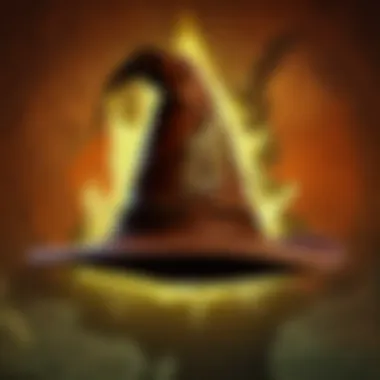

Recognizing the significance of house identity also encourages introspection. It prompts fans to reflect on their qualities. This can lead to personal revelations about their own strengths and weaknesses. Such assessments foster both self-acceptance and motivation to change or enhance certain character traits appropriately.
In addition, house identity plays a crucial role in the broader cultural narrative of the Harry Potter universe. Fans often participate in events, forums, and discussions, exhibiting house pride. This pride preserves the meaningful aspects of house culture while enhancing each member's experience in navigating the larger fandom.
Ultimately, the significance of house identity cannot be understated. It drives community and personal improvement, while also enriching the engagement with a beloved platform of storytelling.
Community and Belonging
House identity solidifies relationships among fans. Each house serves as a micro-community; individuals often seek each other out, sharing stories and experiences around mutual traits. A Hufflepuff may bond with another by discussing loyalty and hard work, while a Ravenclaw might explore the depths of knowledge together.
House initiatives often foster collective activities like Quidditch tournaments or house-based fan art competitions, creating camaraderie among participants. Furthermore, online platforms and social media provide spaces for discourse and collaboration.
The result is a network where like-minded individuals gather, support each other, and celebrate their preferences. This environment fuels friendships that may even extend beyond the scope of fandom.
Personal Branding in Fandom Culture
House identity profoundly impacts how fans present themselves within fandom culture. Choosing a house is equivalent to embracing its values, which can be an articulation of personal branding. For example, fans representing Slytherin may emphasize ambition in their career or academic pursuits, whereas a Gryffindor may show leadership in community events.
Merchandising around house identities has also flourished, offering everything from themed apparel to accessories that assert a fan's allegiance. Such products serve not only as good marketing but also cultivate a visual language of identity.
More significantly, participating in fandom discussions, both on sites like Reddit and social media platforms, enhances individual reputations. Fans contribute insights and content that reflect their more defined personalities brought by their selected houses. This creates a distinct persona within the cyclic world of fandom, which can have wide-ranging social impact.
As one navigates fandom, their house becomes something they embody, thus creating an enriched interaction not only with fellow fans but also with the creativity and critical thinking intrinsic to the Harry Potter narrative.
Methods to Identify Your House
Identifying one’s Hogwarts house is a pivotal outcome of engaging with the Harry Potter universe. The significance of house identification lies not merely in personal interest, but also in the larger context of communal ties within fandom. Each house holds not only its famed attributes but also a sense of belonging and identity among its supporters. Clear methods exist to identify which house resonates most with an individual, ensuring that the selection process feels authentic.
Understanding the various techniques available serves as a structured approach to achieve accurate identification. These methods cater to diverse preferences and inclinations toward technology and self-analysis. Incorporating both official and community-driven quizzes allows for a comprehensive picture, benefiting enthusiasts at every level of engagement.
Each method offers its particular advantages and intensifies the excitement surrounding this evaluative experience.
Official Sorting Quizzes
Official sorting quizzes, such as Pottermore's Sorting Quiz or similar assessments created by Warner Bros., draw inspiration from the source material. These quizzes are designed with close adherence to the established lore of Hogwarts and seek to measure traits and preferences appropriately within the house framework. The format typically presents situational questions that challenge a participant to respond according to personal ideologies or behaviors.
Official quizzes possess a few significant advantages, such as:
- Consistency: The structure ensures alignment with Harry Potter lore, leading to results illuminating foundational canon qualities of each house.
- Authenticity: Taken by many fans, reports vary widely but share a consistent methodology for traditional assessments.
- Bespoke Experience: Official platforms often accompany results with information that provides expanded insights into chosen traits related to various houses.
Utilizing these official assessments endows users with a sense of legitimacy and connection to the broader Harry Potter community. Results from these quizzes are often shared openly among fans, enhancing the collective experience within fandom.
Fan-Made House Quizzes
Beyond official avenues, fan-made quizzes proliferate across various fandom-related websites and forums. Concerned enthusiasts willingly support the Potterverse ecosystem, resulting in diverse alternative quizzes. While these may stray from Harry Potter's exact law, they infuse creativity and personal tastes among potential house affiliations. Most fan-generated quizzes utilize less restraint, leading to unique presenting styles.
Advantages of fan-made quizzes include:
- Variety: An expanse of options presents a differing set of questions and themes for individuals who have engaged with the material in varied ways.
- Community Engagement: Participation fosters connections among fans who shared quiz have results, enabling personal narratives to develop.
- Fun-Elements: Some cheerfully crafted freak show filter can offer lighthearted moments, emulating lively spirit within house associations.
Engaging in these fan-made methods potentially enlightens a fandom perspective founded in unique interpretations and varied imaginings.
Introspective Reflection on Traits
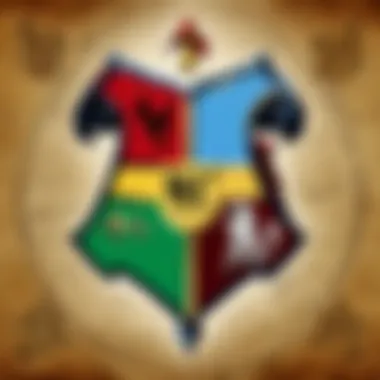

A more individualized method combines personal contemplation and self-exploration. Instead of relying on external assessments, delving into innate dispositions offers a distinctive journey towards house identification. Here, the focus lies in understanding genuine character traits and values. Reflect on defining moments or overarching life choices can spell illuminate which house embodies your true essence. Key considerations include:
- Self-awareness: Evaluating as to where personal alignments fall aligns with one's behavioral patterns or desires fosters clarity.
- Listening Inner Voice: Thoughts around competitiveness or shared values stem our innate characteristics.
- Life Circumstances: Contemplating pivotal experiences that define interaction with different environments could assist recognition aligning with Slytherin or Hufflepuff, for example.
By nurturing self-awareness and increasing trust in philosophical interpretations, fans cultivate intrinsic house identities that provide unrefined clarity.
In essence, methods to discover your Hogwarts house harness personal connection and engagement with Harry Potter franchise within various frameworks, empowering individuals to invest in house affiliation throughout their fandom hobby.
Comparing Rankings of Different Quizzes
When seeking to identify your Hogwarts house, active consideration of various sorting quizzes becomes crucial. The Hogwarts house you identify with can reflect personal traits and community connections. Thus, examining the rankings of different quizzes provides a broader understanding of how reliable and effective they can be. This comparative analysis illuminates vital elements, benefits, and necessary considerations connected to each source.
Evaluating Official Sources
Official sources play a significant role in the sorting narrative. Websites affiliated directly with the Harry Potter franchise, like Pottermore or Wizarding World, offer structured and researched quizzes designed by the creators of the Harry Potter universe. Such quizzes tend to maintain consistency and depth due to their direct ties with the source material.
- Benefits of official quizzes:
- Authenticity: Ensures alignment with Harry Potter canon.
- Nuanced questions: Engages users with thoughtful inquiries reflective of true characteristics of house traits.
However, note that these quizzes might not always be easily accessible, or you could encounter technical issues. Therefore, you should remain aware and adaptable.
Understanding Community Preferences
The Harry Potter community frequently responds to the results from official sources by creating informal, fan-oriented alternatives. Engaging with updated knowledge on community preferences offers valuable insights into trending values among players, especially if you exist in diverse fandoms like eSports or gaming.
- Community-driven qualities:
- Fan quizzes reflect current fandom sentiments and popular understandings.
- Diverse question style encourages exploration of traits beyond all canonical elements.
Observations indicate evident alignments or discrepancies in the preference for fan quizzes versus official ones within certain demographics based on prevailing trends or culturally embedded fandom values.
Trustworthiness of Fan Quizzes
Navigating fan-designed quizzes involves understanding their appeal yet also requiring discretion regarding their trustworthiness. Many detective nuances in these optional quizzes allure participants with entertaining questions and alinkerment to myriad features of character reflectiveness, rather than collecting solid survey results. Therefore, caution remains essential when determining how valid the outcomes are.
- Factors to consider:
- Credibility: Who created the quiz? What sources do they reference?
- Sample size: Responses should comprise varying demographics to ensure relativity.
Most importantly, ensure that whichever quiz you select accurately represents your values. Rushing into conclusions can have a lasting affect on your sense of identity within the Hogwarts universe.
Challenges in Identifying Your House
Identifying your Hogwarts house can be a nuanced journey. It is not just about taking quizzes or answering questions in a hasty manner. Many challenges arise that can affect how accurately you find your place within the Hogwarts houses. These challenges involve both internal and external influences.
Personal Bias and Preferences
Personal bias plays a significant role in how we perceive ourselves and our traits. Everyone has unique strengths and weaknesses, and the way we view these aspects can skew our house identification process. When taking quizzes or reflecting on who we are, we may unconsciously favor certain answers based on what we aspire to represent. For example, someone who values bravery might identify with Gryffindor more readily, regardless of other inherent characteristics. This preference can lead to misidentification.
A deeper understanding requires acknowledging this bias. Trying to answer questions more objectively can help appreciate the complex nature of our personalities. However, this is often easier said than done. What we want to be may not always align with our true selves.
It is important to embrace an honesty when assessing your traits. Ask yourself the right questions. What are my real traits? Which aspects of my personality challenge conventional notions? By confronting personal biases, there is a clearer path to understanding which Hogwarts house you naturally belong to.
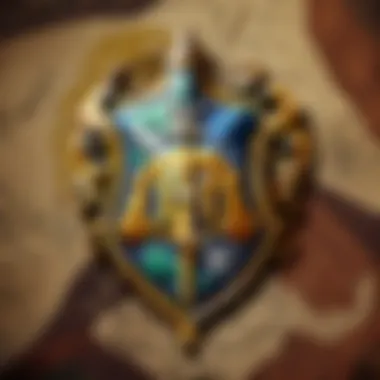

The Influence of External Opinions
External opinions can greatly impact your journey of house determination. Friends, social media and even community forums have varying perspectives which may sway your own beliefs about yourself. For instance, if your friend claims you would only fit into Slytherin because of your strategic nature, this idea may unconsciously influence your decision. You could start associating your qualities solely with that house, disregarding other possibilities.
It is healthy to consider different views but doing so without losing your own perspective is vital. Being open to gods and collective opinion can enrich your understanding of oneself. However, strid within this experience can cause inconsistency in feelings toward your authentic house fit. It is key to maintain a balance; take in what resonates but do not let peer perspectives overwhelm your individual insights.
In the end, the path of identifying your Hogwarts house involves navigating various challenges. By being mindful of hizi influences and invoking self-reflection, greater clarity will emerge. _Your house is a reflection of who you truly are, corrupted truths can hider an accurate assessment of that. _
Reflections on House Identity Over Time
Understanding how our identity as Harry Potter fans can change over time is crucial for a deeper connection with our chosen Hogwarts houses. The notion of house identity is not static; it evolves as we navigate life experiences and personal development. Such reflections reveal how the values and traits of a house can resonate differently as we encounter new challenges and forge our own paths.
Changes in Self-Perception
Self-perception shapes how we understand ourselves within a Hogwarts house. The traits associated with each house can feel more or less relevant depending on personal circumstances. For instance, a person who identifies with Gryffindor's courage might view this trait as integral during substantial challenges, like competing in esports tournaments. Conversely, during quieter moments, attributes from Hufflepuff, such as loyalty and hard work, might gain prominence in one's self-assessment.
Key aspects regarding self-perception may include:
- Situational Influence: As individuals face varying life phases, their traits represented within a house may change in significance and applicability. What settles as priorities now might reshape tomorrow.
- Knowledge Accumulation: Growth in knowledge influences perspective. Insights gained through interaction in fandom communities might lead individuals to embrace different characteristics of their house.
Overall, changes in self-perception may solidify or alter one's loyalty to a specific house, making the journey of self-discovery all the more complex.
Evolving Within a House Framework
Evolving within the context of Hogwarts houses allows individuals to observe growth and aspirations that align with house values. A player stirred by Slytherin’s ambition may find that as they reach goals in gaming, their focus becomes more pronounced on teamwork and collaboration, concepts often associated with Hufflepuff.
In evaluating evolution within the house framework, consider the following elements:
- Adaptation of Traits: Each moment requires a balance of traits selected from various houses. For instance, a Dota 2 player might embody Ravenclaw’s thirst for knowledge while also applying Slytherin strategies to outsmart competitions.
- Experiential Learning: Experiences mold a stronger affinity to certain house traits. Through different tournaments or gaming scenarios, one can learn and grasp what truly defines success for them.
By giving attention to house identity over time, one can gain deep insights into adaptive gameplay as well. Embracing this reflective journey helps foster a more genuine attachment to chosen houses and reveals the underlying strengths of each attribute as they play out in real life.
Final Thoughts on House Identification
Determining one's Hogwarts house is more than a simple classification. It shapes individual identity within fandom culture, and can even influence one's social interactions. As we conclude this exploration, it’s essential to consider how house identity interplays with personal values, community roles, and individual growth.
Embracing House Traits
Every Hogwarts house encapsulates distinct traits. For instance, if you find yourself resonating with Gryffindor courage, or perhaps a Hufflepuff’s unwavering loyalty, it can offer understanding of yourself. These traits serve not only as a mirror reflecting your strengths and weaknesses, but they become focal points for personal development.
Embracing these house traits fosters a sense of belonging and pride. Individuals may benefit from finding their contributions to both the fandom and social settings by embodying specific qualities.
Benefits of Embracing Traits
- Personal Growth: Recognizing and nurturing these traits adds layers to one's personality.
- Community Engagement: Shared traits create bonds within fan communities, fostering group efforts and collaborations.
- Cultural Impact: House traits, when shared, enhance others’ understanding of the common values present in magical storytelling.
As the Harry Potter universe encourages re-evaluating oneself, understanding your traits gives access to deeper insights into collaborative dynamics in both casual and competitive environments. In cybersports, for example, Gryffindors may take unexpected risks, Hufflepuffs play with synergy, while Slytherins plot strategies to win.
Navigating the Community Landscape
Being aware of one’s Hogwarts house is a way to navigate the complex fandom landscape. Different communities may prioritize diverse values related to one’s house. It can both restrict choices and expand interactions. Griffindor might find many allies among other daring spirits, while Hufflepuff nurtures lasting friendships built on mutual trust and resilience.
Strategies for Effective Navigation
- Engage Actively: Participate in community forums, like Reddit or Facebook groups, to share experiences.
- Seek Diverse Perspectives: Explore insights from various perspectives across houses to build a broader understanding of the fandom.
- Balance Opinions: Take into account both personal inclinations and external feedback when engaging with community content.
Embracing these strategies offers avenues to deepen connections formed through shared love of stories and experiences related to Hogwarts houses.
“Identifying your house is more than just curiosity; it is essential in understanding your role in the community.”

